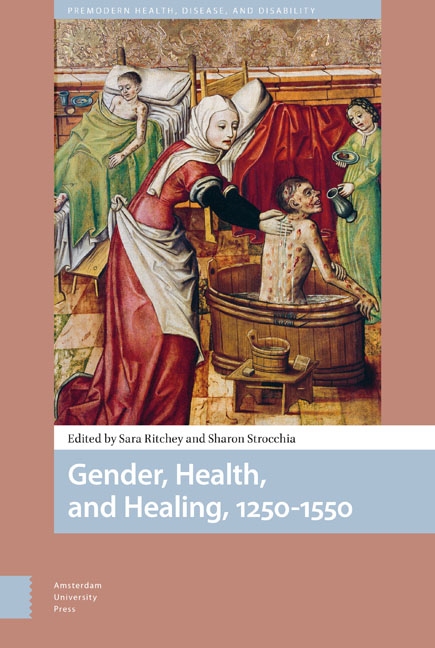Book contents
- Frontmatter
- Contents
- List of Figures and Tables
- Acknowledgments
- Abbreviations
- Introduction: Gendering Medieval Health and Healing: New Sources, New Perspectives
- Part 1 Sources of Religious Healing
- 1 Caring by the Hours: The Psalter as a Gendered Healthcare Technology
- 2 Female Saints as Agents of Female Healing: Gendered Practices and Patronage in the Cult of St. Cunigunde
- Part 2 Producing and Transmitting Medical Knowledge
- 3 Blood, Milk, and Breastbleeding: The Humoral Economy of Women's Bodies in Medieval Medicine
- 4 Care of the Breast in the Late Middle Ages: The Tractatus de passionibus mamillarum
- 5 Household Medicine for a Renaissance Court: Caterina Sforza's Ricettario Reconsidered
- 6 Understanding/Controlling the Female Body in Ten Recipes: Print and the Dissemination of Medical Knowledge about Women in the Early Sixteenth Century
- Part 3 Infirmity and Care
- 7 Ubi non est mulier, ingemiscit egens?: Gendered Perceptions of Care from the Thirteenth to Sixteenth Centuries
- 8 Domestic Care in the Sixteenth Century: Expectations, Experiences, and Practices from a Gendered Perspective
- 9 Bathtubs as a Healing Approach in Fifteenth-Century Ottoman Medicine
- Part 4 (In)fertility and Reproduction
- 10 Gender, Old Age, and the Infertile Body in Medieval Medicine
- 11 Gender Segregation and the Possibility of Arabo-Galenic Gynecological Practice in the Medieval Islamic World
- Afterword: Healing Women and Women Healers
- Contributors
- Index
1 - Caring by the Hours: The Psalter as a Gendered Healthcare Technology
Published online by Cambridge University Press: 23 June 2021
- Frontmatter
- Contents
- List of Figures and Tables
- Acknowledgments
- Abbreviations
- Introduction: Gendering Medieval Health and Healing: New Sources, New Perspectives
- Part 1 Sources of Religious Healing
- 1 Caring by the Hours: The Psalter as a Gendered Healthcare Technology
- 2 Female Saints as Agents of Female Healing: Gendered Practices and Patronage in the Cult of St. Cunigunde
- Part 2 Producing and Transmitting Medical Knowledge
- 3 Blood, Milk, and Breastbleeding: The Humoral Economy of Women's Bodies in Medieval Medicine
- 4 Care of the Breast in the Late Middle Ages: The Tractatus de passionibus mamillarum
- 5 Household Medicine for a Renaissance Court: Caterina Sforza's Ricettario Reconsidered
- 6 Understanding/Controlling the Female Body in Ten Recipes: Print and the Dissemination of Medical Knowledge about Women in the Early Sixteenth Century
- Part 3 Infirmity and Care
- 7 Ubi non est mulier, ingemiscit egens?: Gendered Perceptions of Care from the Thirteenth to Sixteenth Centuries
- 8 Domestic Care in the Sixteenth Century: Expectations, Experiences, and Practices from a Gendered Perspective
- 9 Bathtubs as a Healing Approach in Fifteenth-Century Ottoman Medicine
- Part 4 (In)fertility and Reproduction
- 10 Gender, Old Age, and the Infertile Body in Medieval Medicine
- 11 Gender Segregation and the Possibility of Arabo-Galenic Gynecological Practice in the Medieval Islamic World
- Afterword: Healing Women and Women Healers
- Contributors
- Index
Summary
Abstract
This essay explores a psalter, Liège, Bibliothèque de l’Universitè MS 431, as a tool for the construction and transmission of women's therapeutic knowledge. It places the psalter in its institutional context at the beguinage of St. Christopher’s, which maintained relationships with hospitals and a leprosarium in Liège. Given its context in feminine circuits of care, the essay argues that several features of this psalter, supported by comparative evidence from other contemporaneous psalters from the region, indicate the ways that beguines incorporated prayer and liturgical performance into their practice of daily caregiving.
Keywords: liturgy, poetry, performance, passions of the soul, beguines, Liège
When young Ida of Nivelles fled her home to escape an unwanted marriage, she slipped out of a window, taking only her psalter, and found refuge among the local beguines living next to the hospital of St. Sépulchre. While living there, Ida often participated in the nursing care that beguines in the region provided. She gathered clothing, footwear, food, and ‘other necessary edibles’ (‘caetera esui necessaria’) from residents of Nivelles to distribute to the poor and sick in the hospitals of St. Sépulchre and St. Nicholas. While occupied in these endeavours, a patient at St. Nicholas called Ida over to her bed in order to test her motivation for this constant caretaking. She asked Ida to beg in the streets on her behalf to determine whether she aided the sick ‘purely for God's sake’ or for ‘flattery and show?’ Ida quickly responded to this entreaty, insisting that she did not wish the sick woman to remain indigent (‘sustineas indigentiam’). As a result, the hospital patient was convinced of Ida's genuine desire to serve the sick and dying.
As this story indicates, the thirteenth-century Life of Ida of Nivelles renders in pious terms her labour to provide nursing services. Tales of Ida’s caregiving contributed to her reputation as a ‘ready handmaid of Christ’ (‘statim ancilla Christi’). This hagiographic process suggests how the health agency of religious women (‘mulieres religiosae’) was encoded in other social norms. Ida's identity as an efficacious bedside healer was conveyed through her gendered connotation as a compassionate handmaid.
- Type
- Chapter
- Information
- Gender, Health, and Healing, 1250–1550 , pp. 41 - 66Publisher: Amsterdam University PressPrint publication year: 2020



